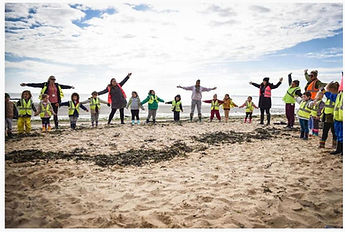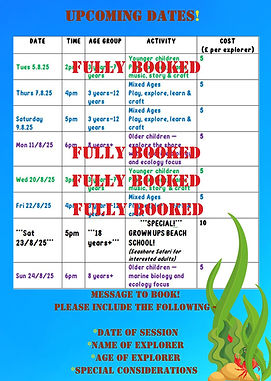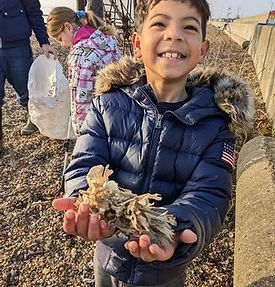

Immersion in the marine world...
Connection with the marine world....
Care for the marine world....
A future for the marine world....
A future for all of the world.
Funding extended for September/October!
If you have an interested EYFS class, that has not already attended sessions, please make contact!
See what has happened so far this year here.

.jpg)

Beach-based learning for children aged 6 months-11 years.
Seaside Explorers is a multi-subject, outdoor activity session for accompanied children aged 3-11.
It is organised and run by Libby Scarfe.
NEWS UPDATE
The middle of April saw the commencement of another ambitious community initiative that engaged all EYFS school aged children in Harwich and surrounding areas. Funded jointly by Harwich Haven Authority and Boskalis Westminster Ltd, the sessions were designed to enhance children's understanding of all things maritime with a play based approach; whether it be working in the industry, getting closer to marine life or considering how we can play a role in the care of the marine world locally and globally.

DT meets science. Squishing sand to make
a structure stronger and increase its height.

Looking at how the geographical and historical aspects of the beach have changed.

Recreating beach words using natural resources. Practising fine motor skills, sensory and kinaesthetic learning.

Phonics at the beach for year 1 using words inspired by the environment. Increasing vocabulary and knowledge.

Adapted learning for
SEND children. Braille phonics using stones.
Supporting children's learning
Beach schools give children the opportunity to appreciate many aspects of beaches and the coast which they may not have thought about or even experienced at all.
They provide children with the opportunity to explore their natural surroundings in an organised setting.
The general idea of a beach school session is to not follow a fixed plan but rather to be more fluid and to follow children’s instinctive curiosity. Then, meet their learning and developmental needs through the natural world. What’s great about beach schools is no two beach school sessions will ever be the same.
The benefits of beach schools are endless, here are a few ways that beach schools can benefit children.
Some of the typical topics explored during beach school sessions are:
-
How to be sensible, safe and responsible when using/enjoying the beach.
-
Explore the effects that changing seasons and tides have on the coast.
-
Understand sea defences, what hard and soft sea defences are.
-
Take part in mini beach cleans and know why this is important for the environment.
-
Explore the natural coastal environment.
-
Explore how marine flora and fauna have adapted to survive in their environments and how different weather conditions affect them.
-
Discuss pressures on the marine environment. E.g, marine pollution and overfishing.
-
Discover marine protected areas.
-
Identify different species and learn more about them.
-
Explore and discover coastal habitats.
-
Learn survival skills such as shelter building, fire lighting and cooking outdoors.
Schools
Early Years
When working with primary schools, a more structured approach to the beach school sessions takes place. An aspect of the curriculum is focused upon to reinforce school based learning; we use the outdoors to facilitate that learning by bringing the subject to the beach and using natural resources to enhance classroom experiences.
Examples of such learning could be Maths- data handling (collection of beach materials and the construction of graphs), Literacy – Poetry (using the marine environment as a stimulus for creative writing), Science – Investigating Materials (separating mixtures), Art –Prehistoric Art (using found materials to create cave art), Geography – Maps (creating maps of the local area and looking at examples), History – Vikings (invasion, boatbuilding, treasure concealment) and DT – Construction (building using found materials)
The wide-eyed realisation that academic learning has a real and physical value is priceless!

Beach school provides the opportunity for younger children to improve their balance and co-ordination, work together on activities and learn to take turns. It also helps them to develop an appreciation and understanding of the beach setting and overcome any apprehensions about sand and getting wet!
With a variety of explorative activities the children have the opportunity to experience sensory play, craft activities and nature learning all whilst building confidence and self-awareness.
Children are encouraged to take risks, follow routines and be responsible for themselves and others.
How does Beach School support children's learning?
Seaside Explorers follows the Forest Schools ethos. For example, the adults use an observation based approach to interact with children’s play, using ‘teachable moments’ with Zone of Proximal Development and Sustained Shared Thinking Theory in mind. Another key theme of the Forest and Beach Schools' ethos is creating relationships with nature. Children that attend Beach Schools get an amazing opportunity to connect with the natural environment of the beach; pebbles, sand, water, oozing mud as well as all of the habitats for wild animals. This offers a chance for children’s education to be completely learner centred. Children are involved in the decision making process about their experiences of the beach, and their learning.
Click on this link for a recent article on beach school.
1. They help children to develop social skills.
Learning whilst outdoors requires engagement and a lot of effective communication. The coastal environment presents multiple opportunities to engage children in group activities. They will develop their communication and social skills by working in a group. The change in surroundings, and leaving the four walls of a classroom can greatly help a child to become more sociable.
2. They encourage children to be independent.
Beach schools are a great way to encourage children to not only work as part of a team but to also explore independently and think independently whilst being guided in a safely assessed session.
3. They help children to build confidence.
Beach schools and learning outdoors encourages children to take well thought out risks. This develops confidence in children. Everyone is different and classroom environments simply don’t suit all children. Some children will totally thrive outdoors but they may not have been very confident in a classroom setting. This transformation can often transfer back into the classroom.
4. They develop physical skills.
Activities such as picking up seaweed or seashells are working those fine motor skills, stamina and gross motor skills naturally without children even realising it. A good run along the beach is fun and getting children to be physically active. Yoga is incorporated into our beach school sessions to explore balance, strength and stamina in the beach setting.
5. They get children motivated.
It’s no secret that exercise and fresh air leaves us feeling motivated. Learning skills and taking part in activities at beach Schools gets children motivated and concentrating. This engagement and ability to focus on specific tasks and concentrate for extended periods of time is extremely beneficial for children.
